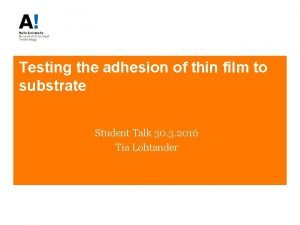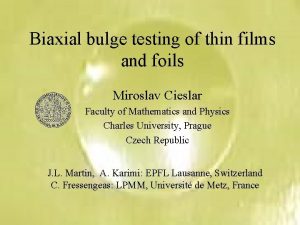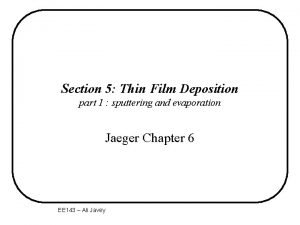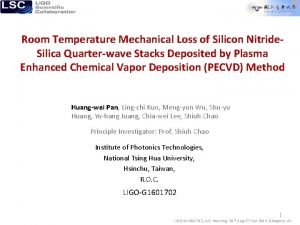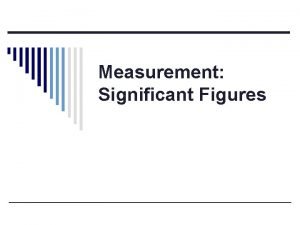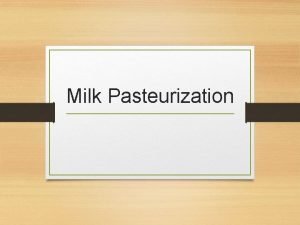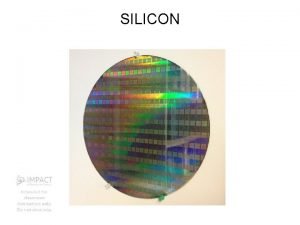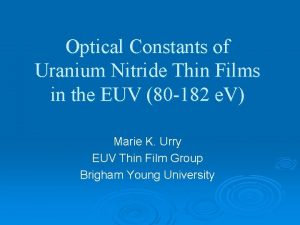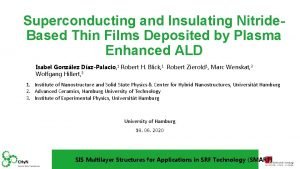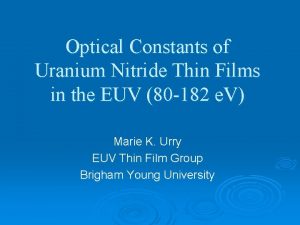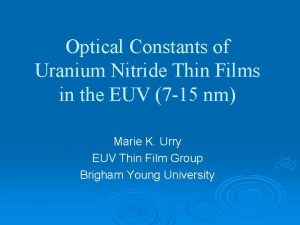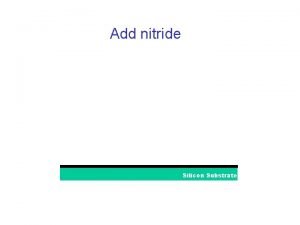Low temperature deposition of silicon nitride thin films










- Slides: 10

Low temperature deposition of silicon nitride thin films by hot-wire CVD University of the Western Cape A. Adams and C. J. Arendse Energy Postgraduate Conference 2013

Outline • Introduction • Experimental Details • Results • Conclusion • Acknowledgments

Introduction • Solar power – – Energy crises Viable alternative Amorphous solar cells Antireflective coating for increased efficiency • Multitude of uses stemming from stoichiometric tunability – – Permeation barrier Gate insulator in thin film electronics Passivation of dangling bonds Antireflective coating Deposition Method • Current technique of choice is PECVD – – Ion bombardment, resulting in oxidation Complex (potential difference, plasma source) • Desired technique of choice is HWCVD – – – Ease of upscale Eradicates bombardment (absence of plasma ions) Low cost High deposition rates of > 7 nm/s Low temperature deposition

Experimental details • The a-Si. N: H thin films were deposited at Tw=1400 °C, Ts = 240 °C, P = 100 µbar, ΦH 2 = 20 sccm, ΦSi. H 4 = 5 sccm and ΦNH 3 = 1 – 7 sccm (LOW PARAMETERS) Technique Reflectance Information · Thickness · Band Gap · Refractive index · Si. N bonds FTIR · Total bonded H EDS · N/Si ratio · Surface morphology · Roughness · H depth profiling · N/Si ratio · Phase AFM ERDA TOF-HIERD XRD

Results and discussion • Decrease in deposition rate as ΦNH 3 is increased • Competing reaction at the filament • Decrease in surface roughness as ΦNH 3 is increased • columnar structures decreases

Results and Discussion • Films are uniform • Negligible oxidation occurred in the bulk NH 3 = 5 sccm • • Increase in N content as NH 3 is increased To. F-HIERD and EDS corroborate well

Results and Discussion

Results and discussion • Linear relation between static refractive index and N content • Direct relation between Tauc band gap and N content

Conclusion • • • High quality a-Si. N: H deposited at low processing parameters, suitable for device applications (permeation barrier, Passivation layer) Resistant to oxidation Tuneable refractive index Corroboration between EDS, To. F-HIERD Low H content Silicon rich Films Future Work • Incorporation in organic PV devices

Acknowledgments • Financial Support − − University of the Western Cape National Research Foundation (NRF) • Team ‒ A. Adams, Prof. C. Arendse, Dr. T. F. G. Muller, Dr. G. Malgas, Dr. C. Oliphant and Dr. M. Msimanga.

